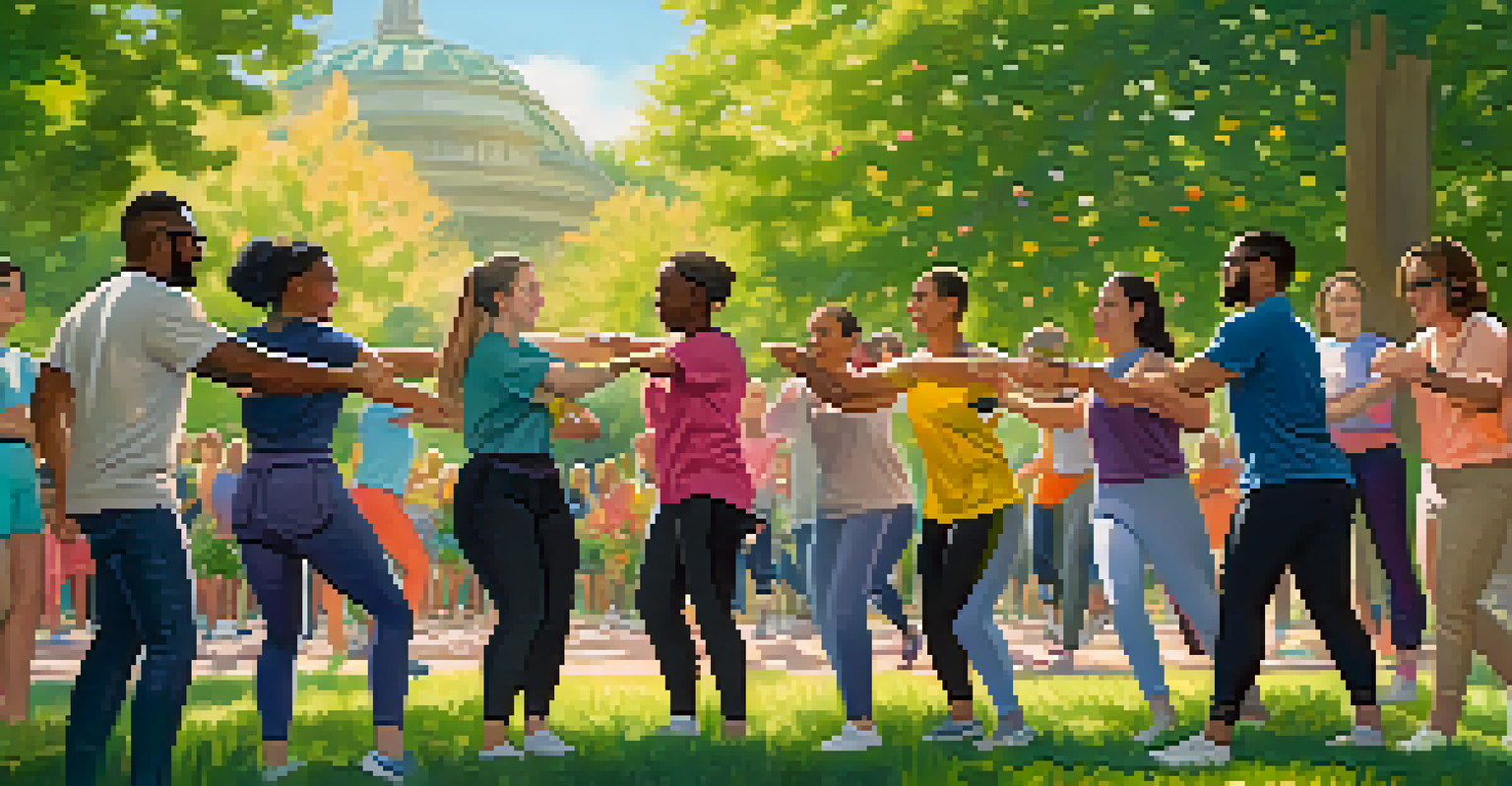Building Confidence: Self Defense Training for LGBTQ+ People

Understanding the Importance of Self-Defense
Self-defense is more than just physical techniques; it's about empowerment and confidence. For many in the LGBTQ+ community, the need for self-protection can stem from experiences of discrimination or harassment. Knowing how to defend oneself can provide a sense of security and reduce anxiety about potential threats.
Self-defense is not just a set of techniques; it's a way to build confidence and empower individuals to take control of their lives.
Additionally, self-defense training fosters a supportive environment where individuals can learn and grow together. It creates a sense of camaraderie, allowing participants to share their experiences and challenges. This community aspect can be incredibly uplifting and affirming for many people seeking a safe space.
Ultimately, self-defense training serves as a proactive approach to personal safety. When individuals feel prepared and equipped to handle confrontations, they can navigate the world with greater confidence and resilience.
Choosing the Right Self-Defense Program
When selecting a self-defense program, it's crucial to find one that understands the unique needs of the LGBTQ+ community. Look for instructors who prioritize inclusivity and create a safe learning environment for all participants. Programs that emphasize respect, communication, and understanding can help foster a positive experience.

Consider programs that address not just physical techniques, but also mental strategies for dealing with confrontations. Training that includes situational awareness and de-escalation tactics can be incredibly beneficial. This holistic approach empowers individuals to handle various scenarios with confidence, both physically and mentally.
Self-Defense Empowers Individuals
Self-defense training provides not only physical skills but also boosts confidence and mental resilience, particularly for those in the LGBTQ+ community.
Finally, don't hesitate to ask questions or seek feedback from others in the community who have participated in self-defense classes. Personal recommendations can lead you to the programs that resonate most with your values and needs.
Physical Techniques: Breaking Down the Basics
Self-defense training often begins with basic physical techniques, which are essential for building muscle memory. These techniques can range from simple escape maneuvers to effective striking methods. Understanding these fundamentals helps individuals feel more in control during potentially threatening situations.
Community is the foundation of personal growth and empowerment. Together, we can foster a safe space for everyone.
Practice is key in mastering these moves, and repetition helps instill confidence. As participants become more comfortable with the techniques, they can gradually increase their intensity and complexity. This gradual approach allows individuals to build their skills without feeling overwhelmed.
Moreover, physical training in a supportive environment can significantly boost self-esteem. As individuals gain proficiency, they often find that their overall confidence extends beyond the training mat and into their daily lives.
Mental Resilience: Building Confidence from Within
While physical techniques are vital, mental resilience plays an equally important role in self-defense. Training often includes exercises designed to boost confidence and decision-making skills under pressure. This mental aspect helps individuals remain calm and focused during stressful situations.
Visualization techniques, for example, can empower participants by helping them mentally rehearse successful responses to potential threats. This practice not only prepares them for real-life situations but also fosters a positive mindset. The more individuals visualize their success, the more they believe in their abilities.
Community Enhances Training Experience
A supportive community during self-defense training fosters connections, shared experiences, and ongoing encouragement, making the learning process more impactful.
Building mental resilience also involves confronting fears and challenging negative self-talk. Self-defense training provides a structured way to tackle these issues, encouraging individuals to embrace their strengths and learn from their setbacks.
Creating a Safe and Supportive Environment
A key component of effective self-defense training is the creation of a safe, supportive environment. Instructors should prioritize open communication and actively encourage questions and discussions. This atmosphere helps participants feel comfortable expressing their concerns and experiences.
Support from fellow participants is equally important. Sharing personal stories can foster empathy and understanding, reinforcing the idea that everyone is on a journey together. This sense of community can be especially beneficial for those who may feel isolated or marginalized.
Ultimately, a nurturing environment boosts confidence and encourages individuals to fully engage in their training. When people feel safe and supported, they are more likely to push their boundaries and grow both physically and mentally.
The Role of Community in Self-Defense Training
Community is at the heart of effective self-defense training for LGBTQ+ individuals. Training together creates bonds that can extend beyond the classroom, fostering friendships and support networks. These connections can be incredibly valuable for personal growth and confidence-building.
Additionally, community-driven training often incorporates shared experiences, making the lessons more relevant and relatable. When participants can see themselves reflected in the training, they are more likely to engage and retain what they learn. This shared understanding can make all the difference in the training experience.
Holistic Growth Beyond Techniques
The benefits of self-defense training extend beyond physical techniques, promoting personal growth, self-advocacy, and the ability to navigate life's challenges.
Moreover, community members can provide ongoing support and encouragement long after the training has ended. This network can help individuals stay accountable in their self-defense practice, ensuring that the skills they’ve learned remain sharp and fresh.
Empowerment Beyond the Mat
The benefits of self-defense training extend far beyond the physical techniques learned during classes. Participants often leave feeling empowered to assert themselves in various aspects of life, whether it’s standing up against discrimination or navigating social situations. This newfound confidence can be transformative.
In addition to physical self-defense, individuals may find themselves more equipped to handle emotional and social challenges. The skills learned in training can translate into improved communication, boundary-setting, and self-advocacy in daily interactions. This holistic empowerment is a significant aspect of the journey.

Ultimately, self-defense training fosters a sense of agency and self-worth. When individuals recognize their power, they become advocates for themselves and their communities, creating ripple effects that can inspire others.